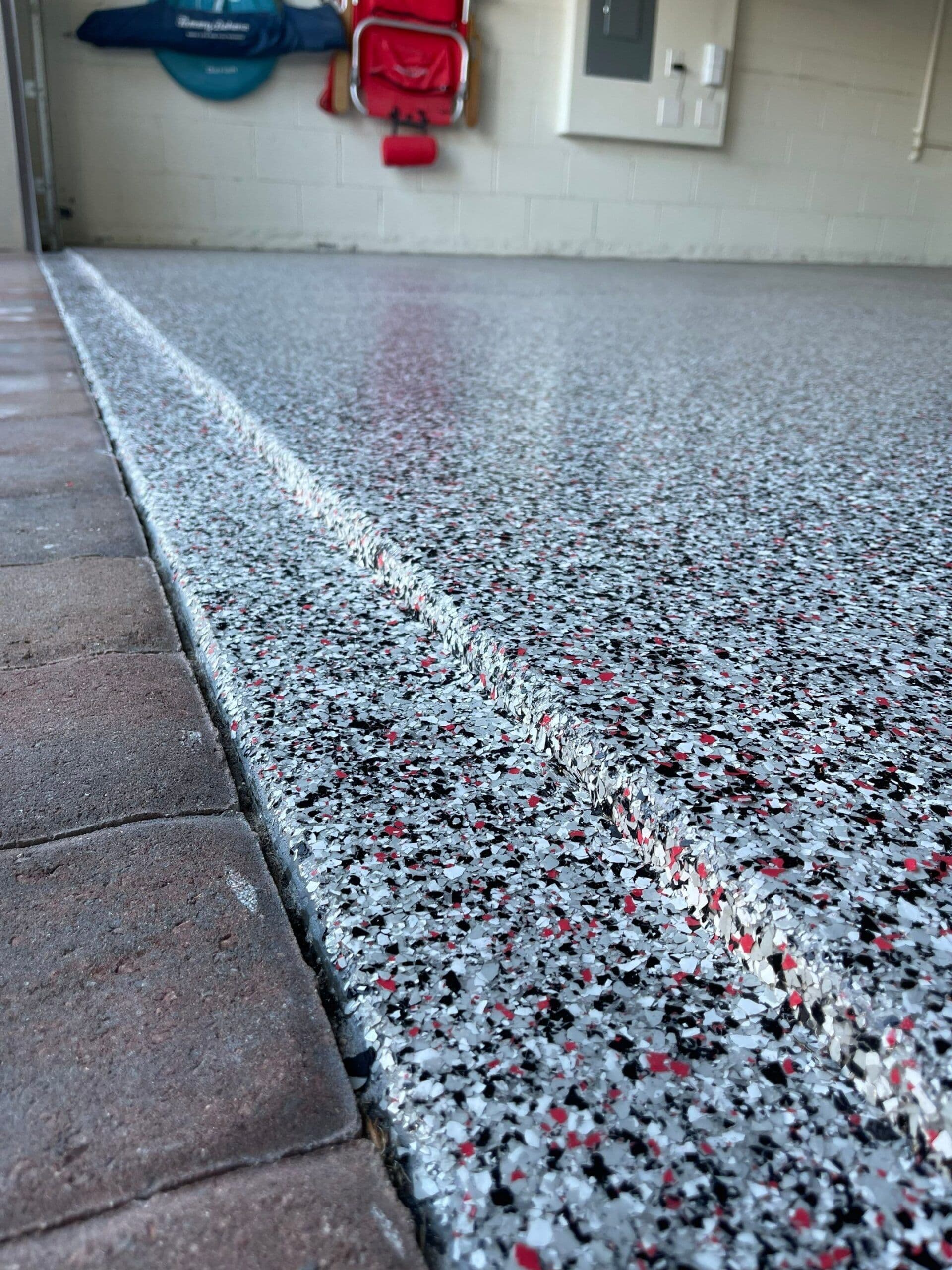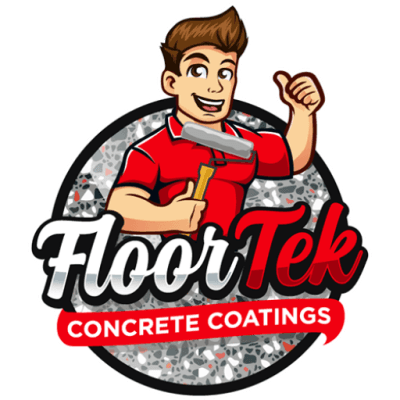How to Truly Maximize Your
Concrete Lifespan
(And Why Epoxy Fails)
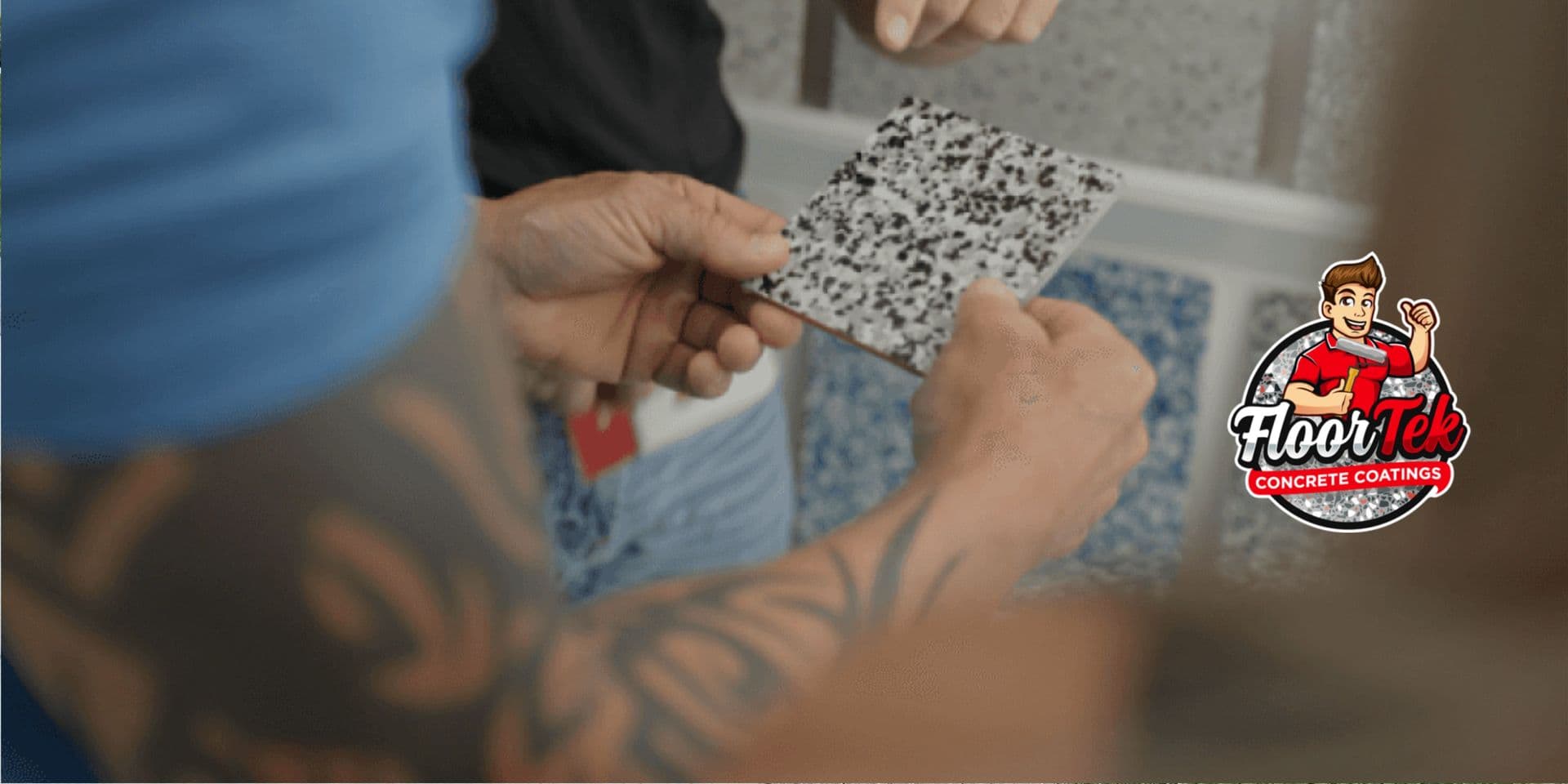
As a homeowner, the vulnerability of your property's concrete is a significant concern. Whether it's your driveway, garage floor, or new patio, these seemingly solid, permanent fixtures are not as invincible as they appear. The truth is, your bare concrete is susceptible to a range of damaging factors.
Here in the United States, your concrete is under constant attack. From the brutal freeze-thaw cycles in the Midwest and Northeast to the relentless UV rays in the South and West, your slab is fighting a battle it will eventually lose. It’s porous, meaning it soaks up water, road salt, oil, and chemicals. This leads to cracking, spalling (flaking), and ugly stains. The concrete lifespan you were hoping for gets cut shorter every single season.
Many homeowners try to address this issue with a 'quick fix, ' often an epoxy floor kit from a large retailer. Unfortunately, these solutions usually exacerbate the problem, leading to more frequent repairs and shorter concrete lifespans.
At Floortek Coatings We’ve spent years replacing these failing epoxy floors. We firmly believe in doing things right the first time. The key to a long concrete lifespan isn't just the quality of the concrete itself, but how it's protected. This article will reveal what truly determines concrete's lifespan and how to safeguard your investment in the long term. Contact us today to learn how our protective solutions can extend the life of your concrete.
What is the Actual Lifespan of Concrete?
If you ask an engineer, they might give you a technical answer. However, for homeowners, the lifespan of concrete slabs, such as driveways, patios, and garage floors, is typically 20 to 40 years. A structural foundation might last 100 years, but the "surface" slabs you walk and drive on are much more exposed to the elements.
However, this estimate is highly dependent on ideal conditions. The moment real-world factors, such as harsh climates or poor maintenance, come into play, that number can drop significantly.
The life expectancy of concrete It is not set in stone, no pun intended. It's a range that depends entirely on a few key factors:
The Installation: Do you know if the concrete mix is correct? Did it have the right strength (PSI)? Was the ground below it compacted properly? A poor installation can cut the concrete lifespan in half before you ever even use it.
This is the most significant factor for us in the US. A patio in San Diego faces very different conditions than a driveway in Chicago, and understanding this helps us recommend the best protection for your environment.
The Maintenance: Is the concrete sealed? Or is it bare, exposed to everything?
People often ask us how long concrete can last, but the real question is, "How long will my concrete last if I do nothing?" The answer is often disappointing. Without protection, you're not just cleaning stains; you're also allowing the slab itself to degrade.
The Top 5 Threats to Your Concrete's Lifespan
Your concrete may look tough, but it's actually full of tiny pores, much like a hard sponge. These pores are the entry point for everything that wants to destroy your slab from the inside out—extending the lifespan of concrete means stopping these threats at the surface.
1. Water and Freeze-Thaw Cycles
This is the number one killer of concrete in the northern United States. Here’s the process:
Water (from rain, snow, or a hose) soaks into the concrete's pores.
At night, the temperature drops, and that water freezes.
As water freezes, it expands by about 9%.
This expansion acts like a tiny, powerful wedge, blasting the concrete apart from the inside.
You see the results as "spalling" or "pitting," where the top layer of the concrete flakes off, leaving ugly pockmarks. This process is detailed by university extensions, such as Iowa State University, which notes the devastating impact this cycle has on slabs. Each winter, the damage worsens, dramatically shortening the concrete's lifespan.
2. Road Salts and Deicers
You use salt to keep your sidewalks and driveways clear of ice. But what happens to that salt? It dissolves, soaks into the concrete with the water, and wreaks havoc.
De-icing salts, especially those containing chlorides, pose a significant problem. They not only accelerate the freeze-thaw damage but can also chemically attack the cement paste itself. Even worse, if your slab has rebar (steel reinforcement) inside, the salt will cause it to rust. Rusting steel expands, cracking the concrete from within. This internal damage, known as "corrosion," poses a critical threat to the lifespan of any reinforced concrete slab.
3. Chemical Stains (Oil, Gas, Fertilizer)
Your garage and driveway are high-risk zones. A small oil leak from your car or a spilled gas can isn't just a surface stain. Those chemicals soak deep into the pores. You can't wash them out. They become a permanent, ugly part of your floor.
Even seemingly harmless substances, such as fertilizers or cleaners, can contain sulfates or acids that can erode the concrete. A bare concrete floor is a map of every spill that’s ever happened on it. This not only looks bad but also weakens the surface, compromising the slab's integrity and shortening the concrete lifespan.
4. Sunlight (UV Degradation)
If you live in a sunny state like Florida, Texas, or California, the sun is a silent enemy. Relentless UV rays don't just fade colors; they can break down the very top layer of the concrete paste over the course of decades. This makes the surface weaker and more prone to "chalking" or "dusting," in which the concrete slowly turns into a fine powder. This is a slow-motion threat, but it's a fundamental factor in the long-term concrete lifespan.
5. Abrasion and Traffic
This one is simple: wear and tear. Driving your car, which weighs thousands of pounds, onto your garage floor or driveway every day can be a significant source of stress. This friction slowly grinds the surface down. You'll see this in older garages where two faint tracks are worn into the floor where the tires always run. This abrasion wears away the "cream" (the smooth top layer) and exposes the rougher aggregate (rocks) below. A good concrete lifespan accounts for this, but bare concrete wears down much faster.
The Epoxy "Fix": A Short-Term Solution to a Long-Term Problem
So, you see the problem. Your concrete is vulnerable. Could you seal it? The most heavily-marketed "solution" is epoxy. You see it everywhere, promising a glossy, durable floor.
We're here to tell you the truth: Epoxy is a temporary fix. It's a plastic-like paint that sits on top of your concrete. It doesn't bond with it. We see failing epoxy jobs every single week, and the homeowners are constantly frustrated.
If you are wondering how long epoxy floors last The answer is typically 3-5 years before they begin to fail, especially in high-traffic areas like garages.
Here's why epoxy fails and why it's a bad investment for your concrete lifespan:
Hot-Tire Pickup: This is the most common epoxy failure. You drive your car, and your tires get hot. You park in your garage. The hot tires soften the rigid epoxy paint. As the tires cool, they contract slightly, literally plucking the epoxy coating right off the floor. Now you have two (or four) ugly, bare-concrete patches.
Peeling and Chipping: Epoxy is rigid. Concrete, on the other hand, naturally moves, expands, and contracts with temperature changes. Epoxy can't flex with it. It cracks, it chips, and it begins to peel away, often starting at the edges.
UV Fading (Yellowing): This is a significant issue that epoxy sellers often overlook. Most epoxy is not UV stable. If you place it on a patio, driveway, or even in a garage with a window, the sunlight will cause it to turn a hazy, sickly yellow color (a process called "ambering") in as little as one year.
Long and Messy Installation: A "DIY" epoxy kit is a weekend nightmare. But even a professional job takes 3-5 days. It requires multiple coats with long drying times in between. The fumes (VOCs) are often terrible and can linger.
The question isn't just how long epoxy Lasts, but how much of a headache is it when it fails? When epoxy peels, you can't just "touch it up." The entire floor has to be mechanically ground off—a dusty, expensive, and frustrating process—before you can even think about starting over. It's a temporary solution that creates a permanent problem.
When you ask how long epoxy lasts on a garage floor The answer is simple: not long enough. It doesn't truly extend your concrete's lifespan; it just covers it up for a little while before it fails.
A Better Way: Polyaspartic Coatings and the True Concrete Lifespan
After seeing so many homeowners disappointed by epoxy, we knew there had to be a better way. That's why we specialize in polyaspartic coating systems at Floortek Coatings.
This isn't just another floor paint. It's an advanced technology that is 10X better than epoxy in every meaningful way.
A polyaspartic coating is chemically engineered to be better. Unlike epoxy, which "sits on top," our polyaspartic base coat is thinner and designed to soak into the concrete, bonding with it on a molecular level. It becomes a permanent part of the slab itself. This is the real way to get a long concrete lifespan.
Why Polyaspartic is the Superior Choice
It's Flexible and Durable: Polyaspartic coatings remain flexible throughout the product's lifespan. When your concrete expands and contracts with the seasons, our coating moves with it. This means no peeling, no chipping, and no hot-tire pickup. Ever. It's tough enough to handle dropped tools and vehicle traffic without issue.
It's 100% UV Stable: This is a significant difference. Our polyaspartic topcoat will never turn yellow or fade from sunlight. Your floor will look just as clear and vibrant in 15 years as it did the day we installed it. This makes it the only wise choice for any outdoor surface.
It's a 1-Day Floor Coating: That's not a typo. We don't take 3-5 days like an epoxy crew. Our trained professionals can prep, grind, repair cracks, apply the base coat, broadcast the flakes, and use the topcoat all in one day. You can walk on your new floor in as little as 4-6 hours and park your car on it the very next day.
It's Totally Resistant: Our coatings create a seamless, non-porous surface. This means road salt, oil, gasoline, chemicals, and red wine all wipe right off. Nothing can penetrate or damage the concrete underneath. This effectively eliminates all the threats we listed earlier, ensuring a long, durable lifespan.
It Looks Amazing: We offer a vast range of Colors and Flake Options To create a beautiful, custom look that adds value to your home. You can see examples in our Gallery.
This is what a permanent solution looks like. This is how you protect your investment and get the concrete lifespan you deserve. Our systems are so reliable that we back them with our Life-of-home warranty.
Our Installation Process
We don't cut corners. A long-lasting concrete lifespan depends on proper installation.
Preparation: We start by diamond-grinding the entire concrete surface. This isn't an acid wash or a light sanding. We use heavy-duty industrial grinders to remove the old, weak layer and open up the concrete's pores.
Mending: We repair all cracks, pits, and spalling with our advanced mending products to create a smooth, solid foundation.
Base Coat: We apply the tinted polyaspartic base coat, which penetrates deeply into the concrete to create an unbreakable bond.
Flake Broadcast: While the base coat is still wet, we broadcast your chosen vinyl flakes to 100% coverage, ensuring the entire floor is evenly covered for a thick, uniform texture.
Top Coat: We scrape off excess flakes, then apply our crystal-clear, UV-stable polyaspartic topcoat. This seals everything in and provides that beautiful, easy-to-clean, and incredibly durable finish.
You can learn more about Our Coating Products I'd appreciate it if you could see why this system is the last one you'll ever need. A long concrete lifespan is possible, but it requires the proper protection.
Where Can You Extend the Life o Your Concrete?
The beauty of our polyaspartic system is that it works everywhere, especially in places where epoxy fails. We don't just do garage floors.
Patios: Our patio coating service It is perfect for outdoor living spaces. It will never fade in the sun, and it's easy to clean up after a BBQ.
Pool Decks: A pool deck coating service Provides a beautiful, textured, and easy-to-maintain surface around your pool.
Driveways: Stop salt and oil from destroying your curb appeal. Our driveway coating service Creates a protective barrier for your home's entrance, extending the lifespan of your most visible concrete slab.
Sidewalks: Boost your curb appeal and protect your walkways with our sidewalk coating service.
Basements: Turn that dusty, damp-feeling basement into a bright, usable living space with our Basement coating service.
Anywhere you have concrete, we can protect it and enhance it. A proper coating is the most critical thing you can do to extend the lifespan of your concrete.
Don't Settle for Bare Concrete or Failing Epoxy
Your home is your most significant investment. That concrete slab is a massive part of it. Leaving it bare is like leaving wood unpainted—it's just a matter of time before it degrades.
Choosing epoxy is like putting a cheap Band-Aid on the problem. It will fail, peel, and leave you with a bigger, more expensive mess than you started with. It shortens your usable concrete lifespan by forcing you to aggressively re-grind the surface every few years.
We want you to know that we aim to provide you with a permanent solution. A floor that looks incredible, is easy to clean, and, most importantly, protects your concrete for good. You can learn more about our mission on our About The US page. We are committed to quality.
This is your chance to do it right. For a limited time, we are offering a 30% Off promotion for first-time installations.
Please don't wait for another crack to appear or another winter to do its damage. Get your Free Quote today. Contact us Through our website or call us right now at 844-844-4164 To speak with a flooring expert. Let's give your home the floor it deserves.
Your Questions About Concrete Lifespan Answered
What is the main weakness of concrete?
That's a great question. Concrete's main weakness is its porosity. Think of it like a hard sponge. It soaks up water, salt, and chemicals, which leads to cracking, spalling, and staining from the inside out. This porosity is the number one enemy of a long concrete lifespan.
How can I make my concrete last 100 years?
To achieve a 100-year lifespan for a concrete slab, it requires two key elements: a thorough installation (with a potent mix and a good base) and a high-quality, non-porous sealer that is both applied and adequately maintained. For patios and garages, a polyaspartic coating is the best way to completely seal them from water, salt, and chemicals, which are its most significant threats.
Does a coating really extend the lifespan of concrete?
Absolutely. A coating extends the lifespan of concrete by protecting it from surface enemies. It makes the slab non-porous, so water can't get in to freeze, salt can't soak in to corrode, and oil can't penetrate to stain. It’s the single best way to protect your investment.
Why does epoxy fail on concrete?
Epoxy fails primarily because it's a rigid, non-flexible paint that "sits on top." It doesn't bond well and can't flex with the concrete's natural movement. This leads to hot-tire pickup (peeling from hot tires) and chipping. It also turns yellow from sunlight, making it a bad choice for most spaces.
Is polyaspartic really better for the life of concrete?
Yes, it's significantly better for the Concrete's lifespan. Polyaspartic coatings bond to concrete, are 100% UV-stable (so they never yellow), and remain flexible. This means they won't peel or chip like epoxy, providing a durable, long-term, and truly protective surface.
What does the freeze-thaw cycle do to concrete?
The freeze-thaw cycle is when water soaks into concrete, freezes, and expands. This expansion acts like a tiny wedge, popping the concrete's surface off. This is known as "spalling" or "pitting" and is a significant reason for the reduced lifespan of concrete in northern states.
Can you fix cracked concrete before coating it?
Yes. A critical part of our professional installation is surface preparation. We don't just coat over problems. We open up all the cracks and fill them with our advanced mending products before applying the base coat.
How long is the lifespan of concrete in a garage?
Unprotected, a concrete garage floor's lifespan can be as short as 10-15 years before it shows severe pitting from road salt and oil stains. A properly coated floor, however, is protected from all of that and can last for as long as you own your home.
What is the best way to protect my driveway's concrete?
The best way to protect your driveway is with a polyaspartic coating. It needs to be 100% UV stable to withstand constant sun exposure and strong enough to resist road salt, de-icers, and fluid leaks. Epoxy fails in this environment, but our system is designed for it.
How is a Floortek 1-day floor installed?
We follow a strict, professional process. We start by diamond-grinding the floor to prepare it. Then we repair all cracks. After that, we apply our polyaspartic base coat, broadcast your chosen flakes, and finally, seal it all in with our UV-stable, polyaspartic clear topcoat. It’s all done in one day.
FREE In-Home Estimate
Plus 30% Off
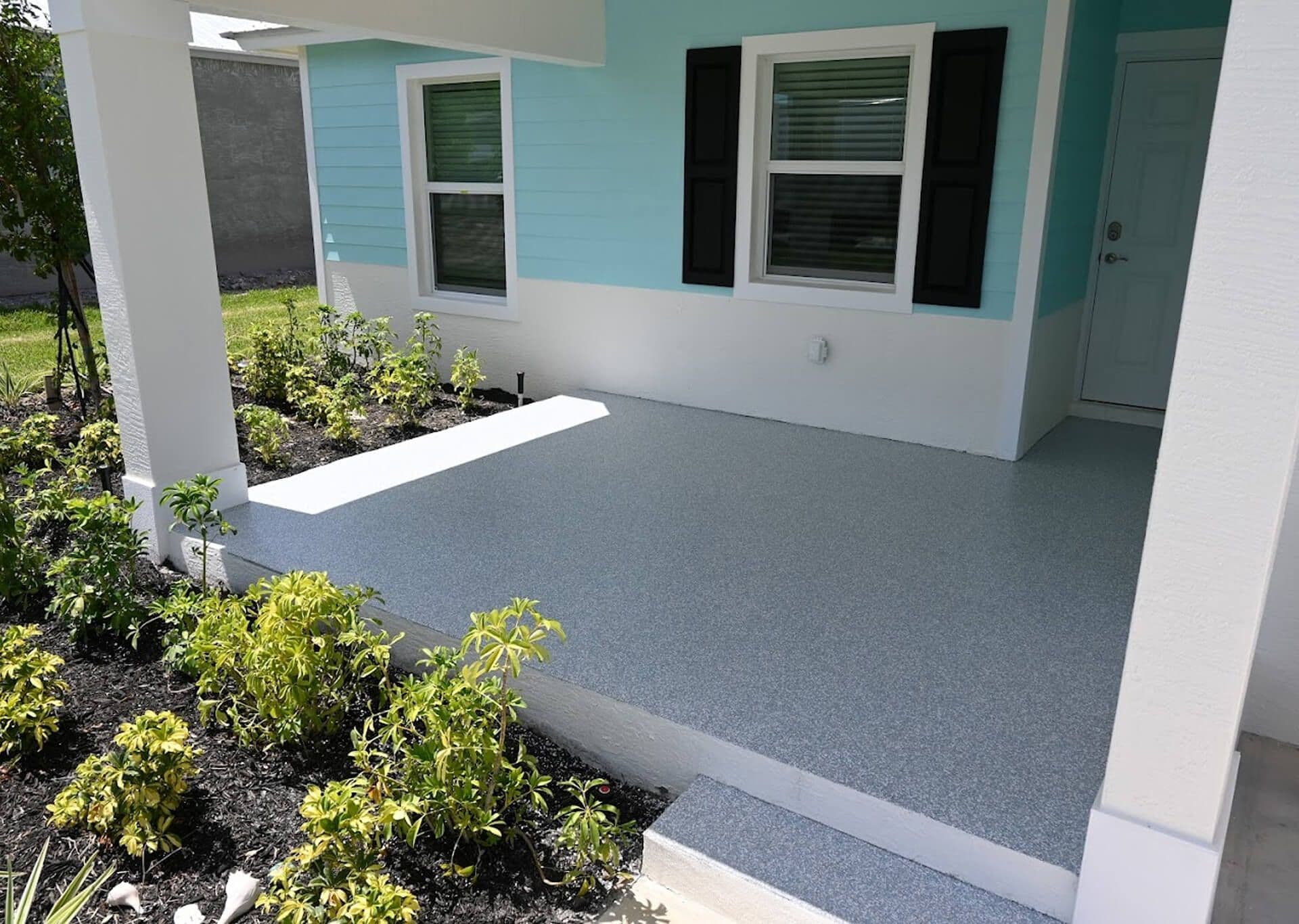
Testimonials
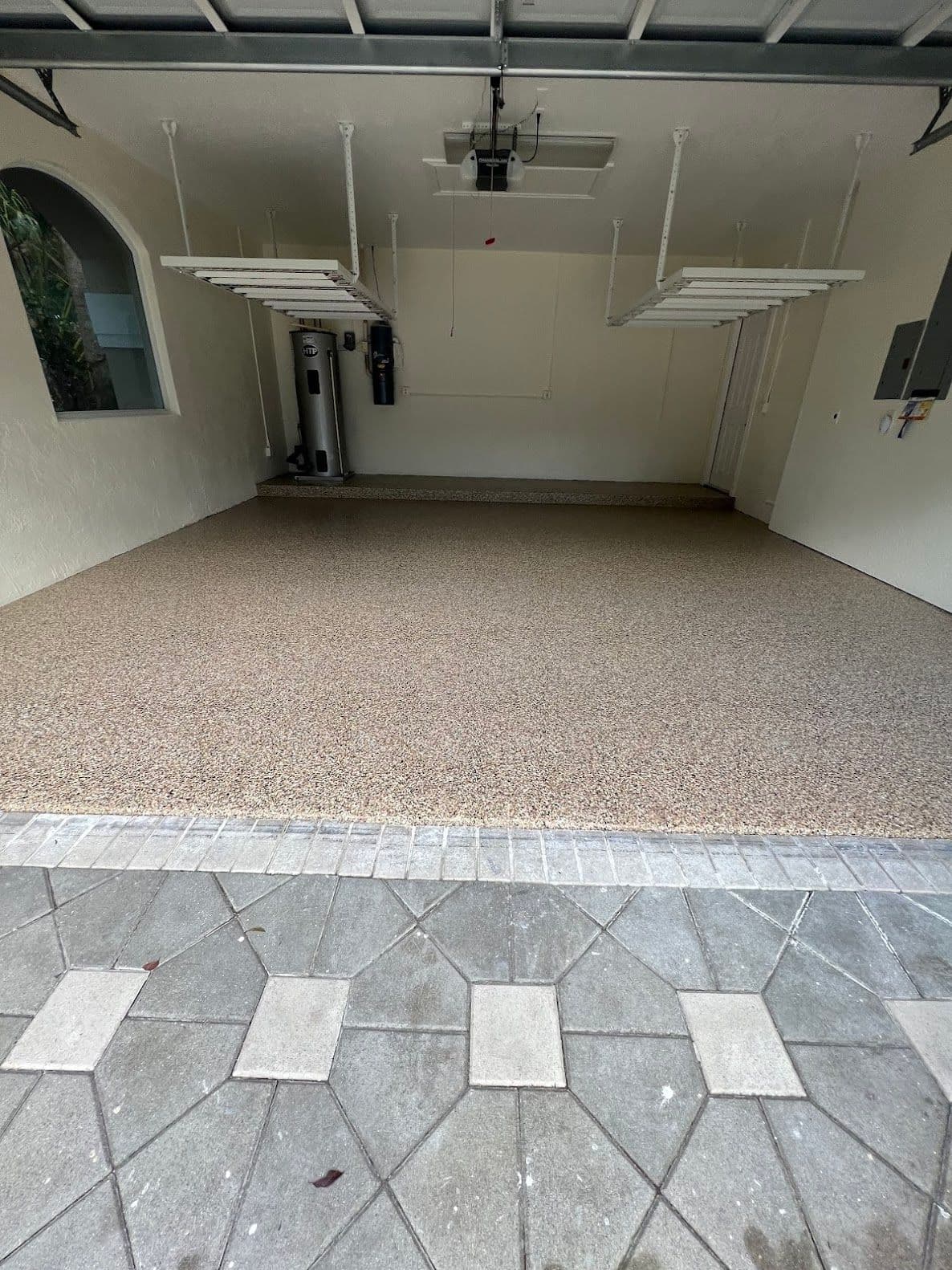
We had both of our garages done and an outdoor concrete platform. The crew was courteous and professional. Everyone from Nancy our salesperson to Patrick, the manager, Logan and his crew were outstanding. Our floors look fantastic and we were very happy we chose this company.
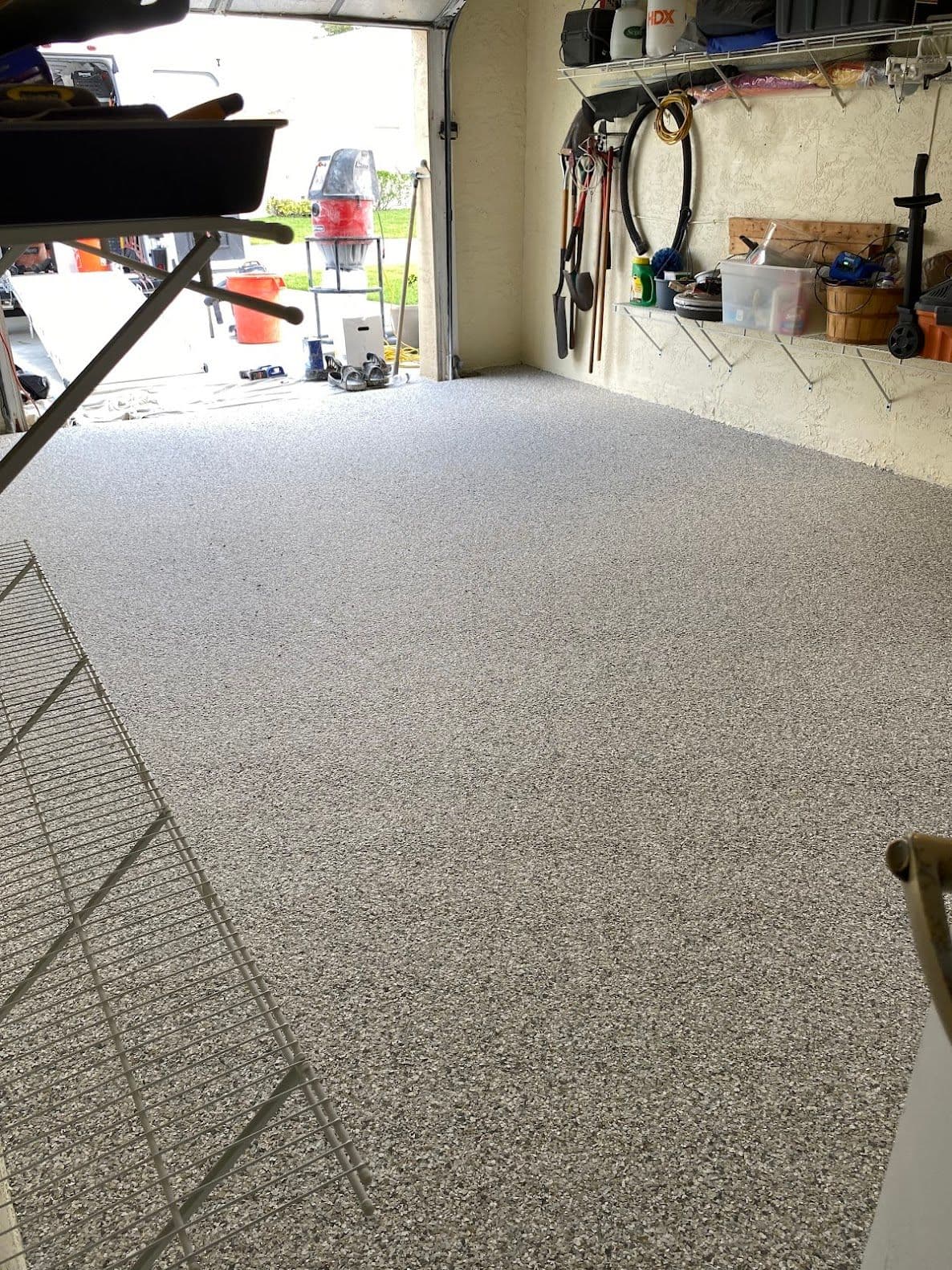
I am very pleased with the quality of work FloorTek has done for me. The two employees that did the actual work were very courteous, worked hard, and explained everything they were doing. Thank you for a great job.
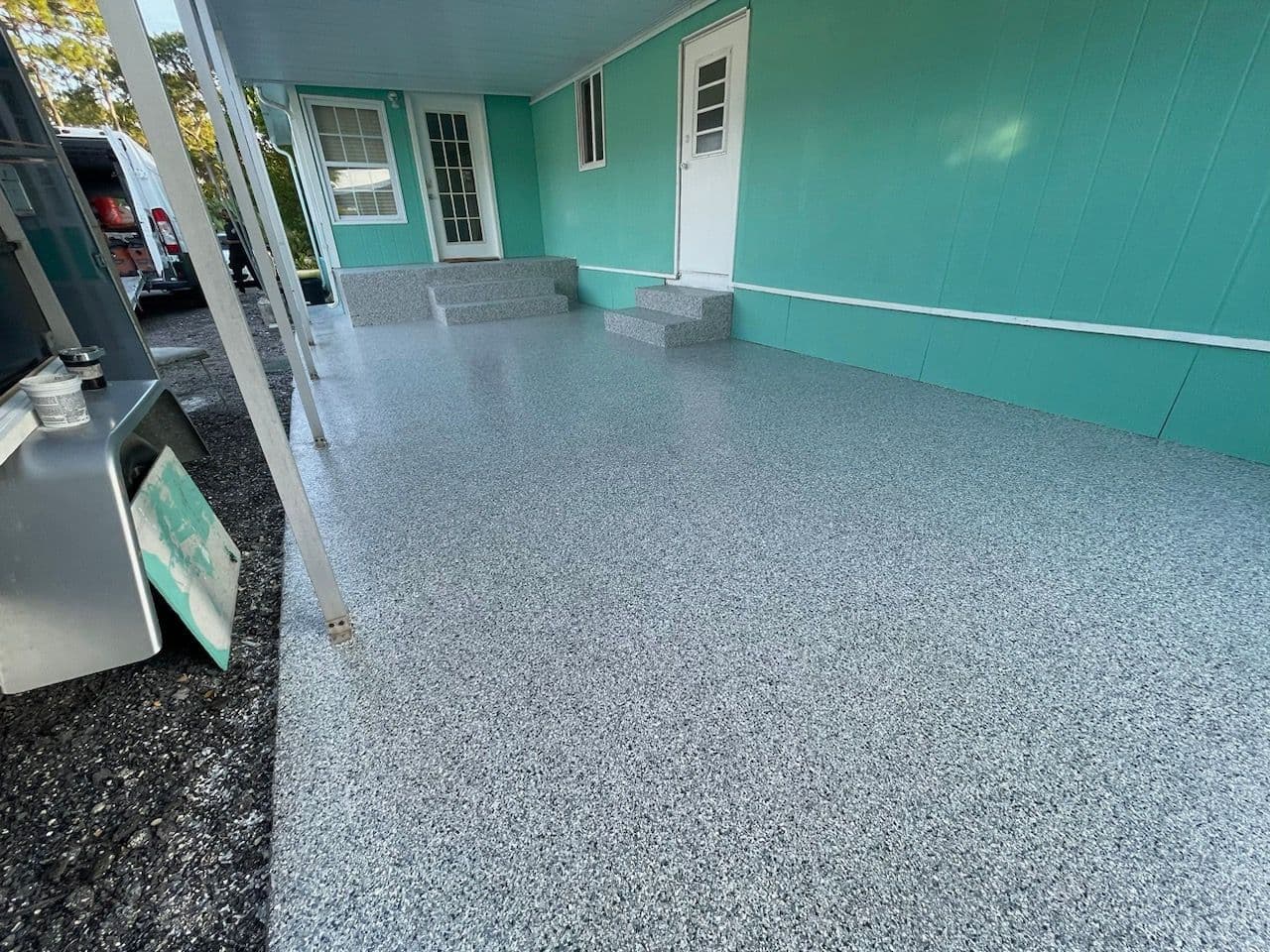
I was happy with the job Floortek did. Good customer communication and customer relationship. My old ugly porch was transformed and I love it. Nancy was very helpful throughout the process. Just know that rain may impact your schedule to make sure the products at highest quality during application.



Contact FloorTek Today
